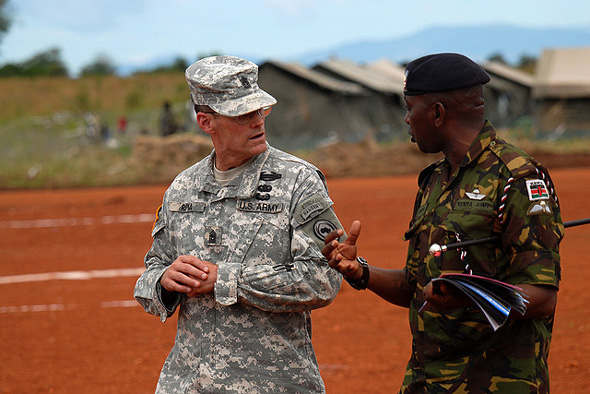-
Should AFRICOM Leave Development to the Professionals?
August 30, 2012 By Schuyler Null
Since its inception, there’s been a great deal of prognostication about the role and goals of the U.S. military’s newest regional command, AFRICOM. The smallest of the six regional commands, in terms of staff and budget, its objectives have included traditional roles like building local military capacities, confronting transnational threats (terrorism, weapons of mass destruction, small arms, drugs, etc.), and helping to mitigate violent conflicts, but also more development-oriented goals, like fighting HIV/AIDs and malaria, “strengthening democratic principles,” and “fostering the conditions that lead to a peaceful, stable, and economically strong Africa.”
The 2012 posture statement, for example, points out that 14 of the top 20 countries listed in the Fund for Peace’s 2011 Failed States Index – which accounts for far more variables than just security – are on the continent.
But, as in Iraq and Afghanistan, not everyone is happy about the Pentagon moving more into the realm of state building. Kate Almquist, on the Center for Global Development’s Rethinking U.S. Foreign Assistance Blog, has written a provocative piece that’s worth a read on combining and confusing development and military efforts:
In her recent Foreign Policy column, “The Pivot to Africa,” Rosa Brooks made a plea for letting go of comfortable old assumptions about roles and missions between the civilian and non-civilian sides of the U.S. government, particularly when it comes to civil-military cooperation in Africa. My plea is for an evidence-based discussion of U.S. development policy and its intersection with U.S. national security.
U.S. interests will be ill-served if we merely move from comfortable old (and false) assumptions about poverty and terrorism in Africa to comfortable new (and equally false) assumptions about “whole-of-government responses” to complex challenges. While the United States should of course think and work creatively, skepticism and, dare I say, opposition, from civilian agencies to AFRICOM taking on non-traditional military roles is not rooted in turf battles but in legitimate concerns about efficiency and results.
In terms of comfortable old assumptions about poverty and terrorism, the reality is far more complex than “poverty breeds terrorism.” We know from empirical research that underlying “root causes” – socioeconomic, political, and cultural drivers of violent extremism – are important.
Continue reading on the Rethinking U.S. Foreign Assistance Blog.
Sources: Center for Global Development, U.S. Department of Defense.
Photo Credit: Distinguished visitors day in Kitgum, Uganda, courtesy of flickr user U.S. Army Africa.
Topics: Africa, conflict, democracy and governance, development, HIV/AIDS, military, security, U.S., USAID
 A Publication of the Stimson Center.
A Publication of the Stimson Center.



